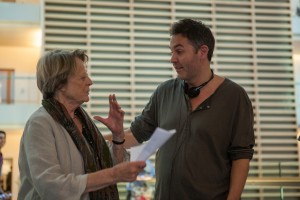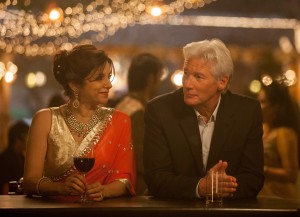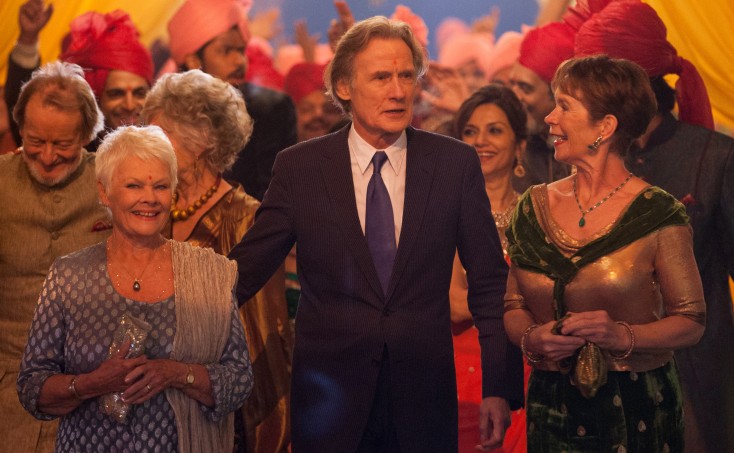
(l-r) Maggie Smith and Screenwriter Ol Parker on the set of THE SECOND BEST EXOTIC MARTIGOLD HOTEL. ©20th Century Fox. CR: Laurie Sparham.
By ANGELA DAWSON
Front Row Features
Few screenwriters have the privilege of writing for the acting legends Maggie Smith, Judi Dench, Bill Nighy, Penelope Wilton, Ronald Pickup and Celia Imrie. Ol Parker not only provided the dialogue for these esteemed actors for the 2011 sleeper hit “The Best Exotic Marigold Hotel,” but he got the chance to do it again.
“The Second Best Exotic Marigold Hotel,” picks up where the original romantic comedy left off, delving deeper into the lives of feisty British ex-pats living in a not-quite-luxury hotel in India, and the fidgety young owner of the hotel (Dev Patel reprising the role of Sonny).
As a change of pace, the film opens not in Asia, but on Route 66, with Sonny and Smith’s Muriel Donnelly zooming to a business meeting in a convertible. Sonny’s senior housing experiment has proven a success back home in India, and he wants to open a second hotel. Engaged to his beloved Sunaina (Tena Desai, reprising her role), he hopes to build on their security by partnering with an American hotel chain to help finance the purchase and renovation of the second location. With just a minor hiccup in the meeting, Sonny and Muriel return to India cautiously optimistic that the deal will close.
When a handsome, older American gent arrives soon after, Sonny suspects he may be an undercover inspector sent by his potential partners, and he fawns over the guest in hopes of securing a good review, pretty much ignoring another new guest (Tamsin Greig), who has some secrets of her own. The dashing new male guest calls himself Guy Chambers (silver-haired but still handsome Richard Gere), who claims to be a novelist looking for a quiet place to write his book. He begins to draw inspiration from Sonny’s widowed mom (Lillete Dubey), who isn’t quite sure she’s ready for romance again. The story, this time around, revolves around the intricate wedding preparations, Indian-style, for Sonny and Sunaina.
The key, Parker says, was finding another story grand enough to tell, without making it like a TV series episode. He credits director John Madden, who also helmed the first one, for getting him over a temporary writer’s block while writing the sequel.
Parker, who is married to BAFTA award-winning actress Thandie Newton (“Crash,” “The Pursuit of Happyness”), with whom he has three children, says he realized the original “Marigold Hotel” had struck a chord with a broad audience (beyond the senior citizen base) when his 12-year-old daughter, Ripley, told him that all her friends had seen it and she wanted to see it too.
The London native recently spoke by phone about revisiting the “Marigold Hotel,” working with “The Dames” again and writing Gere into the script. [private]
Q: Was the title for the sequel a no-brainer?
Parker: I had the title very early on because I knew there would be a search for a second best exotic marigold sequel and that title was really a gift. It was always a challenge to try and match up to what we did on the first one, so it was both thrilling and terrifying.
Q: I’ll bet you were deluged with older actors wanting to be in the sequel because the first one was so successful.
Parker: Yeah, that would be great. It was weird doing the second one because we had the chance to have a lot of (famous) people in it, which is incredibly flattering and nice. But there were lots actors or actors’ agents contacting us and gently nudging their clients on us. It’s pretty incredible that the first movie did well and that there is even a second movie. It’s proof that there is this extraordinary resource that is being ignored, to a large degree is being marginalized not only by the film industry, but the world, in general.
Q: The success of the first film shows that audiences are interested not only in movies about older people but also good stories that don’t rely solely on special effects.
Parker: When the first one came out, it had been out about a month, and my older daughter came home, who was 12 at the time, and she asked me, “Am I ever going to see your movie?” And I said, “Why do you want to see it?” And she said, “Because all of my friends have seen it, and they really like it. It’s a bit embarrassing that I haven’t seen it.” And I said to her, “Sweetheart, I thought it would bore the **** out of you.” So we went, and we took along my 8-year-old, who was bored, but my 12 year old really liked it. It was interesting because it had been out for a while, but the cinema we went to had a lot less pensioners in the audience than I would have expected. So it turned out to be not just a movie for your granny, which would have been fine. I would have been proud to have done that.
Q: What’s the secret of “Marigold Hotel’s” success?
Parker: It’s just stories about people, and there aren’t too many of them made anymore. I got the gig because I had dinner with one of the producers a few months before. We were talking about how as we got older, we didn’t seem to get wiser, or more honest or just better at dealing with things, and we wondered aloud if we would still be struggling romantically, or whatever way, when we were 75.
Then he called awhile later and said, “I may have something about what we were talking about.” So it was always about people doing things; not just old people doing old things. It’s more of a teen movie, the second one, the way they all fall in love and have misunderstandings and there are infidelities. We didn’t want to ghetto-ize it in the same way, with their actions and our perception of them.
Q: What was the biggest challenge in bringing back these characters and giving them new stuff to do and introducing new characters into the movie?
Parker: The first one had a natural three-act structure: people arrive somewhere, they deal with it, and there is somewhere that they go. The second one, they’re where they left off at the beginning, they’re there in the middle and they’re there eat the end. I don’t subscribe to tradition that you have to have three acts and there has to be a crisis somewhere around page 85—all that kind of thing. But you find that films start to fall into those categories fairly easily and scripts are certainly easier to write when they do, so there was that. With that, I got onto Sonny’s wedding, and an Indian wedding is broken up into stages, so we had a sense of moving towards something. Otherwise, it felt a little purposeless when I first started thinking about the sequel. It felt more like an episode of a TV show, like, this is the next thing that happens to each of these characters, rather than any movement towards something.
More figuratively, both the thrill and the challenge was how successful the first one had been. I wrote the first 60 pages thinking, “Oh, this is great. People loved the first one. It’s great to be back in this world. I know I’m writing for Maggie Smith, and what a joy that is. If I think something’s funny, it probably is because it worked the first time.” And then I hit page 60, and all of those thoughts reversed themselves completely, and I began to worry about trampling all over the happy memories people had of the first one.
John (Madden, the director) was off making the pilot for “Masters of Sex,” so he wasn’t around. So I paced the park in London for a month going, “I can’t write a word. I can’t do this.” And then he came back and calmed me down.
Q: Was it the wedding plotline that helped you over the hump?
Parker: Yeah, it was writing towards something. I had to realize that you can’t analyze why the first one succeeded because then you start second-guessing yourself about what (the audience) wants or thinking that this is The Marigold Way. That’s for someone else to define, not me. He just asked me, “What’s the next line of the next scene? What’s the second line?” Once you do that, once you get back to basics, and start listening to the characters again, then it starts to flow, hopefully.

Lillete Dubey as “Mrs. Kapoor” and Richard Gere as “Guy” in THE BEST EXOTIC MARIGOLD HOTEL 2. Photo by: Laurie Sparham. Copyright © 2014 Twentieth Century Fox
Q: Did you have Richard Gere in mind for the character of Guy? Or did you write Guy first and Gere just fit the puzzle?
Parker: A bit of both, actually. Gloriously, we were incredibly lucky with the first movie, where we literally got our first choice for every part, which was a completely extraordinary thing. There was a guy on the camera crew on the first movie who was very handsome. He was older than me but younger than The Dames (Smith, Dench). He had this coffee machine on the camera truck. And The Dames, who fancied him, would rush over to him every morning and drink massive amounts of coffee just to be around him, and by lunchtime, they’d all be insanely twitchy. So I thought it would be nice to give them eye candy in the sequel, someone to flutter over.
I knew that I wanted the film to start somewhere different as well. You’d think we’d start off back at the Marigold in the warm bath of Thomas Newman’s beautiful music and here are our characters again, but I wanted to shake that up, if only for five minutes, before it settled back into that.
Q: The whole California opening with Maggie Smith, Dev Patel and David Strathairn (as the American hotelier) was a surprise.
Parker: I just wanted it to be different and not what you’d expect. So I thought, “We’ll go to America.” And so, we had that scene where Dev is trying to get an American hotel chain interested in partnering in establishing a second Marigold hotel in India. So we have the second hotel, and the (hotel) inspector. I was thinking about Dev’s sort of puppy-ish enthusiasm, bouncing around people, and I wanted someone very still in the middle of that. I knew I wanted someone at the center who was very handsome and could own the flattery (that Dev’s character was heaping on him). It had to be someone who had spent his life being insanely handsome. I think I wrote the line, “He was so handsome, he had me questioning my own sexuality.” And then I said to John, “I think I’m writing for Richard Gere.” He was like, “Okay, great!”
John had talked with Richard before about working together. A few weeks later we got a message from Richard’s agent who said that he really liked the first one, and he loves India. So then I was writing the character of Guy for Richard. And he came along and did the movie for as little as everyone else. He has no movie-star graces. He just fit right in and was one of the team.
Q: The storyline with him and Mrs. Kapoor (Lillete Dubey) was a nice new romance in this one.
Parker: Thank you. And they got along together great. The real problem was getting them to flirt a little bit less in the beginning. (He chuckles.) She’s gorgeous and he’s a hunk, and they just had a fantastic time together.
Q: Were you on location in India during production?
Parker: Yes. I’ve been privileged and lucky to go to the set of every film that I’ve done. And John (Madden) is famously the nicest man in show business, and also very old school, very theatrical. He believes the most important relationship on the movie set is between the director and the writer. So I was next to him at the monitor. I was there for the casting. And I was in the edit bay with him. If we disagreed about something, then he’ll usually do what I want as well, and then we would figure it out later. It’s as much as you can ask for in a director.
Q: Did you bring Thandie and your children along?
Parker: Not this time. Thandie was pregnant so she didn’t come with me. But she joined me in India on the first one. I was staying at this really ratbag hotel the first time because I’m the writer. For the last week, because we came in on time and on budget, we were able to stay the last week in this (nice) hotel with the actors. So I called Thandie, and told her to join me. It was sensational.
Q: Have your kids watched this one yet?
Parker: My oldest is coming to the premiere with me, but my younger daughter (Nico) was so bored by the first one that she won’t see it.[/private]





